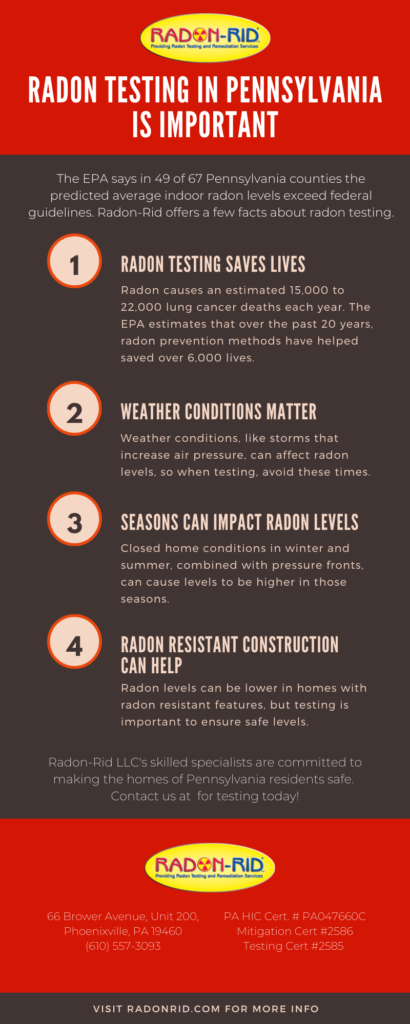Why Pennsylvania Radon Levels Are High and How to Test Your Home
 Why are Pennsylvania radon levels in homes so high? Indoor radon levels are dependent upon the distribution of uranium-rich rocks and soils and the porousness of the earth, near a home. Pennsylvania happens to have a high distribution of these uranium-rich rocks and soils. Different homes, even those close to each other can have varying levels of radon. These levels may be impacted by the condition of the homes, for example more foundation cracks could allow more of the gas to get into the home.
Why are Pennsylvania radon levels in homes so high? Indoor radon levels are dependent upon the distribution of uranium-rich rocks and soils and the porousness of the earth, near a home. Pennsylvania happens to have a high distribution of these uranium-rich rocks and soils. Different homes, even those close to each other can have varying levels of radon. These levels may be impacted by the condition of the homes, for example more foundation cracks could allow more of the gas to get into the home.
Radon is an invisible, odorless, radioactive gas that seeps into homes from the earth via cracks in the foundation or other small openings. Radon causes an estimated 15,000 to 22,000 lung cancer deaths each year. The radioactive gas is present all across the country, but Pennsylvania radon levels are exceptionally high.
 What is a High Radon Level?
What is a High Radon Level?
Nearly every county in Pennsylvania has high radon levels. The average radon level in PA homes is around 7-8 picocuries per liter (pCi/L), while the Environmental Protection Agency (EPA) recommends that homeowners take immediate action at 4 pCi/L. The EPA says in 49 of 67 Pennsylvania counties the predicted average indoor radon screening levels exceed federal guidelines.
How to Test Your Home for Radon
Because Pennsylvania radon levels for each county are different, and the variation between homes can be so drastic, homeowners should test their homes to ensure that their families are safe from radon. Contacting a certified, licensed professional to test your home if there is no mitigation technique in place or to inspect existing mitigation tools will ensure that the results are thorough and accurate.
Radon testing and inspection professionals perform two types of radon testing: short term and long term. Both forms of testing are useful. The short-term method is the most frequently used, while the long-term process most accurately represents radon levels since all seasons and many home conditions are taken into account.
Winter is a good time for testing for radon, as windows and doors mostly remain closed, allowing the testing specialist to collect data for a “worst-case” scenario. If you are planning to buy a new home in Pennsylvania, as well, you should contact the realtor to test the house for radon.
A few additional tips for testing your home for radon:
- Maintain accurate results by avoiding performing short-term tests during storms or high winds.
- Perform the test in the lowest level of the house that people use regularly.
- Avoid moving the test equipment during the testing period.
- If the test is performed for less than a week, try to maintain closed-house conditions as much as possible.
Once testing is complete, PA homeowners can decrease their home radon levels by working with a professional to install a radon mitigation system. Most radon exposure occurs in buildings, so testing and mitigation will keep more homeowners and PA residents safe and healthy.
Radon-Rid, LLC Provides Experienced and Certified Radon Testing and Remediation
We recognize that homeowners across Pennsylvania want to keep their families safe, which is why we strive to inform residents of Pennsylvania radon levels. Radon-Rid, LLC has certified, experienced, and insured radon testing and inspection specialists, so that Pennsylvania residents can be safe and have peace of mind. For a consultation or more information about radon, contact us today.
Related Posts
Why Are More People Testing for Radon in 2020?
Why Should I Hire a Professional Radon Testing and Remediation Company?
Is Radon Testing Necessary When Buying A Home?
We Want to Help
"(required)" indicates required fields
Categories
- Blog (48)
- Environmental Pollution (2)
- Family Health (9)
- In the News (10)
- Lung Cancer (5)
- Radon Remediation (10)
- Radon Testing (24)
Radon – The Silent Killer
Radon In Your Home
- Learn More About Radon Levels in Your County
- Take a few minutes to browse our Get To Know Radon Online Presentation.
- When you are finished, be sure to tell a loved one about our testing programs offered in Berks, Chester, Delaware, Lancaster, Montgomery & Philadelphia Counties.